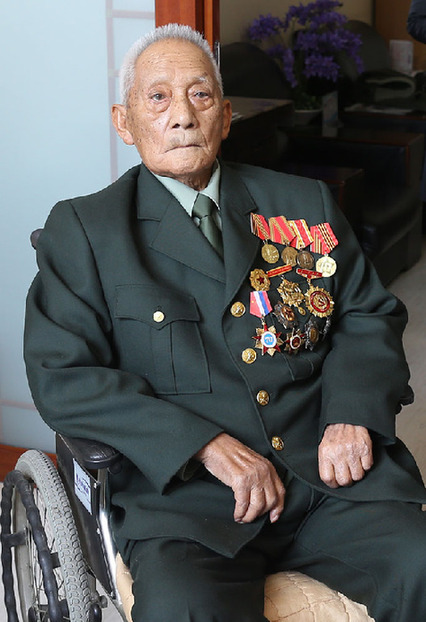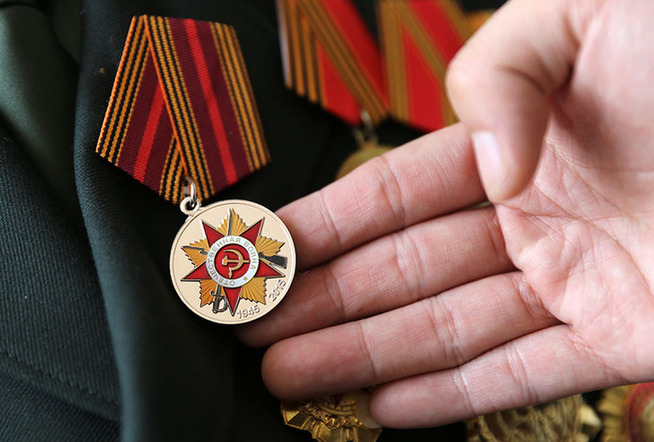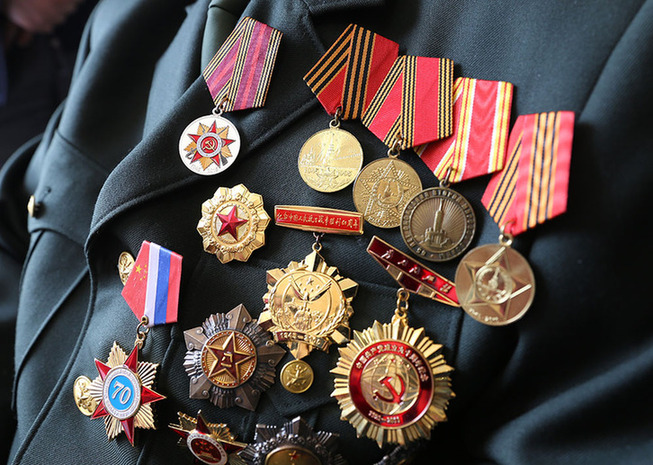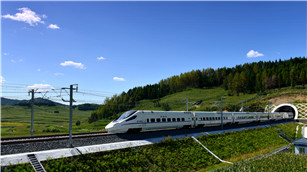Chinese soldier tuned into the Soviet Union's WWII resistance
By Wang Zhen
2015-05-19
The old veteran is sitting there calmly in his wheelchair and ready to start the new day, only he's dressed in his uniform and has a quite serious look on his face — he's received a medal for his service in the 70th anniversary of the Great Patriotic War in the city of Changchun, capital of Jilin province.
Wang Ming, now 93, was a member of China's Northeast United Army against Japanese Invasion and trained as a paratrooper with comrades-in-arms in the Soviet Union during the Great Patriotic War (1941-1945), and was then assigned to Heilongjiang province in China's Northeast to reconnoiter the Japanese situation.
 |
|
Wang Ming waiting for the medal ceremony in Changchun, Jilin province. [Photo/xinhua] |
The nonagenarian veteran has already been through similar ceremonies as seen from the other badges on the top right part of his uniform because of his glorious past, when he and his comrades were witnesses to the victories during World War II, something that many people from both China and abroad cannot but keep in mind.
When Wang joined the northeast army in what is now Heilongjiang province, at the age of 13, war had broken out. The year was 1936 and he was put under the command of Gen. Zhou Baozhong, then gradually matured into a guerrilla fighter in the struggle against the invading Japanese.
In Manchuria, or the northeastern regions occupied by Japanese troops, Wang and his fellow soldiers fought"hard battles"almost every day, as the Japanese encirclement escalated, Wang said in an earlier interview.
Although they were quite experienced, the army nonetheless was gradually worn down by the well-equipped Japanese troops, and Wang and other soldiers retreated to then Soviet Union in the spring of 1941, and for the next several years, were part of the Soviet Red Army.
While in the Soviet army, he was trained as a scout with hundreds of other guerrilla fighters. They also had to learn some basic Russian, parachuting, and how to use a transmitter-receiver, and various war skills for survival in the wild, including driving and swimming with a weapon.
The parachute training involved jumping from 2,000 meters at least 10 times and once, the veteran says, recalling that daring period, he had to push a comrade who was scared of jumping from that high out of the door. But a scout needed parachuting skills if they wanted to ascertain the enemy's strength and movements and dodge attacks. And their diligence and dedication paid off, as Wang said the Chinese soldiers were praised by a senior military official of the Far East Military District. The official said that the Chinese soldiers worked very hard to familiarize themselves with all sorts of equipment and war tactics, Wang recalled.
 |
|
The veteran receiving a medal on the 70th anniversary of Victory, from the Russian government. [Photo/xinhua] |
Later, thanks to the Soviet training, the special Chinese division became the first airborne troops under the leadership of the Communist Party of China. His experience in Soviet Union has never faded from Wang’s memory, or in the words of his eldest son, Wang Keqiang,"Even though my dad is in a confused state of mind when he gets sick, he sometimes murmurs 'Vladivostok' in Russian, the place where he fought for the Soviet Union several times."
In 1942, Wang Ming was sent back to the occupied Manchuria where he was responsible for recording the frequency of Japanese train movements, the number of their garrisons and their arms and ammunition, and relayed the information back to the Soviet Far East Military District.
In the eyes of his fellow soldiers, Wang Ming is a very sharp and quick thinker and could memorize every single detail of the enemy situation.
In the following years, Wang's division continued the fight the invading Japanese and worked together with the Russian Red Army when the latter declared war on Japan on Aug 8, 1945. The military skills of Wang and his fellow soldiers had helped the Red Army greatly as they provided precise information on Japanese movements so that the army can attack the Japanese military more easily.
Japan finally surrendered on Aug 14, 1945. Wang and fellow soldiers in the Northeast United Army against Japanese invasion as well as those Soviet Union-trained scouts have thus become part of the historical event and witnesses to the victory.
 |
|
The Old veteran receiving medals for his great contribution during World War II. [Photo/xinhua] |
Today, people take Wang Ming and his fellow soldiers as heroes and partners of the Soviet Red Army in WWII. While the veteran may not be able to describe his glorious fighting past, the medals on his uniform speak volumes for the bravery of Wang and his fellow soldiers and the hardships they had gone through.




